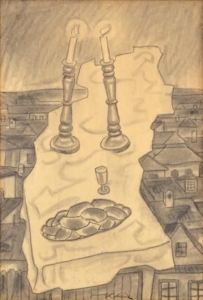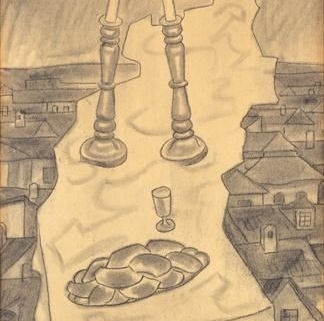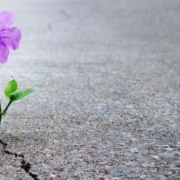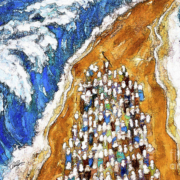A Graceful Table / Graceful Masculinity: Trumah
 Part of a periodic Torah series on graceful masculinity and Jewish values.
Part of a periodic Torah series on graceful masculinity and Jewish values.
וְשַׂמְתָּ אֶת-הַשֻּׁלְחָן, מִחוּץ לַפָּרֹכֶת, וְאֶת-הַמְּנֹרָה נֹכַח הַשֻּׁלְחָן, עַל צֶלַע הַמִּשְׁכָּן תֵּימָנָה; וְהַשֻּׁלְחָן–תִּתֵּן, עַל-צֶלַע צָפוֹן.
You shall place the table outside of the dividing curtain, and the Menorah opposite the table on the southern side of the Tabernacle and the table you shall place on the northern side. (Exodus 26:35)
“Let them build for me a tabernacle and I will dwell among them”. God’s command at the start of Parshat Terumah is famously understood as “I will dwell in each and every one of you.” Why is it necessary then to build G-d a physical space, for the resting of the Divine Presence, if G-d dwells within us all?
To better understand the purpose of the tabernacle and how it allowed us to come closer to G-d, particularly through offerings (the Hebrew word korban, offering, comes from the root meaning to draw close), it is helpful to see how we have responded to our current lack of a physical dwelling place for G-d.
“The altar, three cubits high…This is the table that is before the Lord”. (Ezekiel 41:22): The prophet starts with “altar” and ends with “table”. The Talmud explains the connection: “When the Temple is standing, the altar atones for a person; now (that the Temple has been destroyed), it is a person’s table that atones for them.”
It is for this reason that many have salt on our tables, like the salt that was part of the offerings. It’s also this reason that many remove, or cover, any knives before the grace after meals. The Mechilta understands the prohibition (Exodus 20:22) of using hewn stones for an altar because “[the altar] was created to lengthen a person’s life, and iron was created to shorten a person’s life”. Since the altar should not have cutting implements, there is a tradition to remove them from our tables as well.
The Talmud teaches, “whoever extends their table, their life is extended”. The Rabbis understand this blessing to come when we are prepared to help a person experiencing food insecurity and, more broadly, inviting guests to come together over food.
On the verse, “Cedars are the beams of our house, Cypresses the rafters,” (Song of Songs 1:17) the Gra comments that although G-d dwells among each of us, we needed a singular place to gather and unify all of our individual hearts together. That place was the tabernacle, which was built by the collective, through the individual contributions of the heart. The main resting place for G-d is determined by our hearts coming together as one, whether at the giving of the Torah or in the Temple.
Jerusalem is described by King David as “a city that is united together”, (Psalms 122:3), and is understood by the Jerusalem Talmud as “The city that brings everyone to friendship.” It is perhaps for this reason that we are taught that the Temple was destroyed because of blatant hatred. Destruction is simply the consequence of division and lack of caring for each other.
Being able to come together (socially distanced) around the same table is an act of atonement for separation, and a restoration of the closeness that we once had for G-d, and each other. That is why it is so essential to bring the right intentions to the Table.
In Hebrew, the word for table — שלחן / shulchan — is parsed by the Ben Ish Chai as של חן – shel chein / of grace. “Only when it is filled with grace will it atone” and bring people together. We find the power of the evil opposition alluded to in the word as well. In Psalm 23 King David says “ You prepare a table for me before my enemies.” The word “שלחן” (table) also contains the word “נחש”, snake, an allusion to the potential for food to be misused and cause a separation between people and God.
After nearly a year of being physically apart from each other in community, we find ourselves in Adar אדר which is understood as living together as one א -דר. This coming week we will celebrate Purim which is a holiday of tremendous “unity and togetherness.” Purim is also, though, the only holiday that is not observed by all Jews on the same day, as those in unwalled cities celebrate on the 14th of Adar and those in walled cities celebrate on the 15th of Adar. Being apart or different doesn’t mean that we are not connected, as long as we are able to see the holiness of the Divine in each and every one of us.

By R. Mike Moskowitz.









